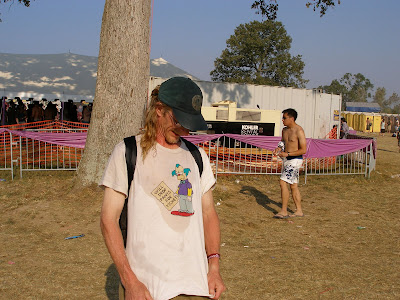Why did The Beatles, and so many other great musicians, come along in the 1960s? I think the answer lies primarily in
technology, which advanced at an unprecedented rate in the post-war period. The electric guitar was still an unproven instrument, until
Jimi Hendrix came along. Many other supply side technologies came to revolutionize the music business, e.g. the advent of the transistor lead to higher quality studio mixing and recording equipment and techniques. Likewise, on the demand side, advances in radio, TV, and the stereo LP facilitated a thick market in music. The spread of the English language also can't be ignored, and The Beatles experienced this as both a cause and effect of their success.
As with any technology, these were adopted at differing rates. The early adopters were mainly baby boomers in the West. Thus, it is no coincidence that The Beatles came from what was once the most economically advanced country in the world. And they weren't alone. Remember the
British invasion? Here is a
list showing the top music exporters in 1997. Note that it looks a lot like a list of today's
richest countries (not per
capita, just total size in GDP). Or the richest in
1970. (The only exception is North Korea coming in at #30 on the music list. Maybe
Curtis can explain that one.)
The lesson is that change implies diversity. In this case, technological change made for a diversity of musical output, both in quality and quantity. If you want to be uncharitable, The Beatles can be seen as monopolists who used technology as a barrier to entry, just as the "robber-
barons" did a century ago in the fast-changing oil and railroad industries. But we are not uncharitable with musicians, and we shouldn't be with other productive enterprises.
So, from this and the
previous lesson we see that prosperity, change, and diversity all go hand-in-hand. Think about that the next time your local politician recommends stabilizing prices, or setting a minimum wage, or capping CEO salaries. Insisting on equality of outcomes means the destruction of diversity, and with it prosperity. And when the State enforces it through coercion, we have lost our liberty as well.
Addendum: Tyler's
latest NY Times article covers much the same ground, and the next lesson on status and culture. This is what happens when you read
someone's blog for 3 years. And take his macro and industrial organization classes.
Correction: Though there were plenty of good musicians in the 1960s, The Beatles were and are singularly huge, selling more than 4 times as many albums as #2, Simon and Garfunkel. No other decade is like that, having one completely dominant player. Maybe Elvis in the 1950s, but he recorded only about 20% of his
albums then. Roughly 1/3 of his biggest
hits were in the 1960s. And The Beatles soon swamped him.
Here is an attempt to put together world-wide record sales.
Here is the more systematic
RIAA data, which I've put in a chart shown below. In the first tier, on the left, it shows the top artist in each of 5 decades. Elvis is the blue bar, The Beatles are light purple, Led Zeppelin is yellow, Billy Joel is green, and Garth Brooks is dark purple. Yes, popular music has really gone down hill. (Thanks to
Jason for the comments which made me do the research.)








































